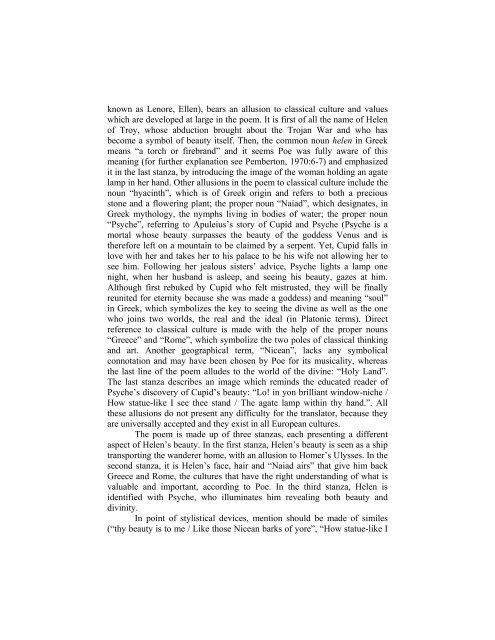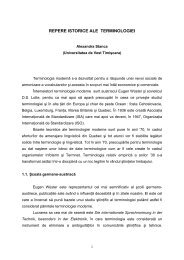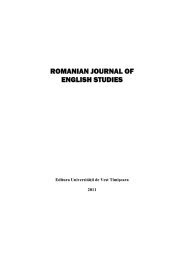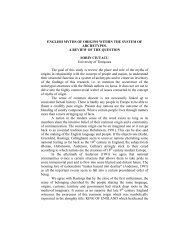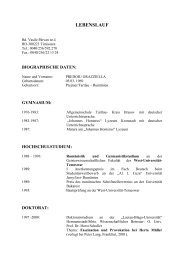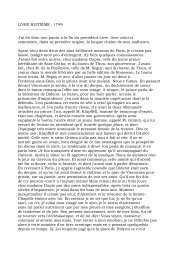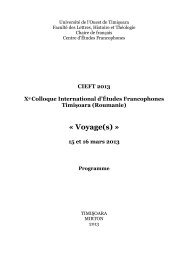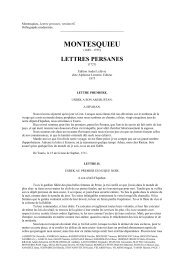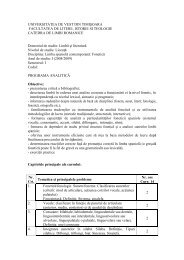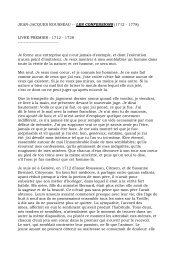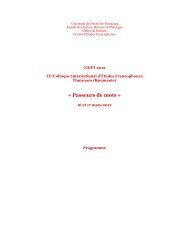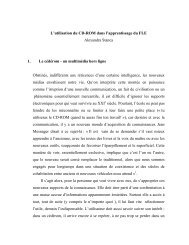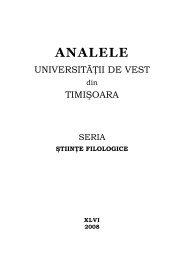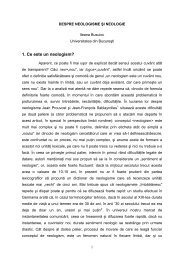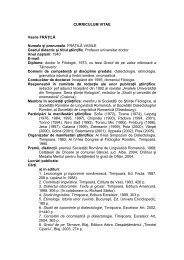TRANSLATION AND MEANING: A CULTURAL- COGNITIVE ...
TRANSLATION AND MEANING: A CULTURAL- COGNITIVE ...
TRANSLATION AND MEANING: A CULTURAL- COGNITIVE ...
Create successful ePaper yourself
Turn your PDF publications into a flip-book with our unique Google optimized e-Paper software.
known as Lenore, Ellen), bears an allusion to classical culture and values<br />
which are developed at large in the poem. It is first of all the name of Helen<br />
of Troy, whose abduction brought about the Trojan War and who has<br />
become a symbol of beauty itself. Then, the common noun helen in Greek<br />
means “a torch or firebrand” and it seems Poe was fully aware of this<br />
meaning (for further explanation see Pemberton, 1970:6-7) and emphasized<br />
it in the last stanza, by introducing the image of the woman holding an agate<br />
lamp in her hand. Other allusions in the poem to classical culture include the<br />
noun “hyacinth”, which is of Greek origin and refers to both a precious<br />
stone and a flowering plant; the proper noun “Naiad”, which designates, in<br />
Greek mythology, the nymphs living in bodies of water; the proper noun<br />
“Psyche”, referring to Apuleius’s story of Cupid and Psyche (Psyche is a<br />
mortal whose beauty surpasses the beauty of the goddess Venus and is<br />
therefore left on a mountain to be claimed by a serpent. Yet, Cupid falls in<br />
love with her and takes her to his palace to be his wife not allowing her to<br />
see him. Following her jealous sisters’ advice, Psyche lights a lamp one<br />
night, when her husband is asleep, and seeing his beauty, gazes at him.<br />
Although first rebuked by Cupid who felt mistrusted, they will be finally<br />
reunited for eternity because she was made a goddess) and meaning “soul”<br />
in Greek, which symbolizes the key to seeing the divine as well as the one<br />
who joins two worlds, the real and the ideal (in Platonic terms). Direct<br />
reference to classical culture is made with the help of the proper nouns<br />
“Greece” and “Rome”, which symbolize the two poles of classical thinking<br />
and art. Another geographical term, “Nicean”, lacks any symbolical<br />
connotation and may have been chosen by Poe for its musicality, whereas<br />
the last line of the poem alludes to the world of the divine: “Holy Land”.<br />
The last stanza describes an image which reminds the educated reader of<br />
Psyche’s discovery of Cupid’s beauty: “Lo! in yon brilliant window-niche /<br />
How statue-like I see thee stand / The agate lamp within thy hand.”. All<br />
these allusions do not present any difficulty for the translator, because they<br />
are universally accepted and they exist in all European cultures.<br />
The poem is made up of three stanzas, each presenting a different<br />
aspect of Helen’s beauty. In the first stanza, Helen’s beauty is seen as a ship<br />
transporting the wanderer home, with an allusion to Homer’s Ulysses. In the<br />
second stanza, it is Helen’s face, hair and “Naiad airs” that give him back<br />
Greece and Rome, the cultures that have the right understanding of what is<br />
valuable and important, according to Poe. In the third stanza, Helen is<br />
identified with Psyche, who illuminates him revealing both beauty and<br />
divinity.<br />
In point of stylistical devices, mention should be made of similes<br />
(“thy beauty is to me / Like those Nicean barks of yore”, “How statue-like I


